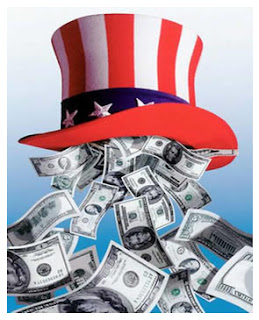A federal grant program aimed at spurring investment in the U.S. solar industry expires at the end of this year, and its supporters are scrambling to get it extended in the lame-duck session of Congress that started this week.
Prospects for renewal dim considerably come January when a new Congress takes over, with a Republican-controlled House of Representatives and a shrunken Democratic majority in the Senate. Many Republicans want to reverse the Obama administration's U.S. energy policy of focusing on renewable energy sources like solar and wind power.
The solar grant program is set to expire at the end of next month, but the White House wants Congress to keep it around longer.
Vice President Joe Biden praised the solar grants last week at an event for the Middle Class Task Force.
"We have to continue to invest in clean energy, so we're also calling on Congress to extend a program that has been really successful," Biden said.
Fans of the program credit it with helping the United States install roughly 1,000 megawatts of solar-electric capacity this year, sustaining thousands of jobs in construction and installation and supplying enough power for up to 220,000 homes.
That is more than double the solar capacity installed in 2009 and around triple that of the year before, according to the Solar Energy Industries Association.
The program was created last year under the American Recovery and Reinvestment Act. Under an already existing program, developers of renewable-energy initiatives could apply for investment tax credits that cover up to 30 percent of a project's costs.
The Recovery Act tweaked that program so that applicants could apply for cash grants instead of tax credits. To qualify for a grant, projects must start construction by December 31. If they start after that, they qualify instead for a tax credit.
The grant program is "critical," said Recurrent Energy chief executive Arno Harris. "It gives us confidence that there are going to be lenders and investors out there with the appetite to fund these projects," he said.
Recurrent was bought last month by Japan's Sharp Corp for $305 million.
At industry leader First Solar Inc, an extension "would make financing easier and cheaper," spokesman Alan Bernheimer said about its plants under development.
If the grant program expires, many developers will be looking for investors who need to offset taxable income with tax credits.
In a weak economy, there aren't as many of those investors, developers say. And borrowing against future tax credits costs more than borrowing against future cash grants-- typically, around 2 percentage points more, developers say. The project must be completed before the Treasury Department allots the cash or tax credit.
If the solar grant program gets extended, it will likely be part of a bigger bill dealing with extending some or all of the tax cuts created by President George W. Bush, analysts say.
Working in favor of an extension is the program's successful track record. It has helped more than 1,300 renewable energy projects in 41 states, according to the Solar Energy Industries Association, making it popular with many members of Congress.
"We're talking about thousands of construction jobs and ongoing operations jobs," said Monique Hanis, a spokeswoman for the association.
The amount of U.S. electricity generated by solar power from January to August this year jumped 24 percent from the same period in 2009, according to the Energy Department. But it still represents less than 1 percent of all electricity generated in the U.S.
An extension has some powerful advocates in the Senate, including Democrats Maria Cantwell of Washington, Dianne Feinstein of California and Jeff Merkley of Oregon, and Republican George LeMieux of Florida. They have introduced a pair of bills that would extend the grants to December 31, 2012.
But Senator Jeff Bingaman, a New Mexico Democrat who chairs the Energy and Natural Resources Committee, backs renewable energy but doesn't like providing grants instead of tax credits.
"Senator Bingaman does not believe that we should be using the tax code for making grants, and also feels that the grant program is akin to corporate welfare," said Bill Wicker, a spokesman for the senator.
A general backlash against the stimulus bill and its perceived failures could also work against an extension of the grant program.
Keith Martin, a project-finance lawyer at Chadbourne & Parke, believes the renewable-energy grant extension has a 40 percent to 50 percent chance of getting through Congress in the lame-duck session.
The chances of passing it in the next Congress are much lower, he said, in part because many incoming congressmen don't believe stimulus provisions overall have worked effectively.
The Republicans who take power in the House in January may target renewables not only to direct U.S. energy policy more toward traditional energy sources, but to also scale back the renewable energy tax breaks in order to cut the budget deficit.
SOURCE

No comments:
Post a Comment